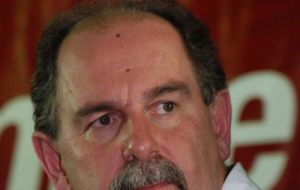MercoPress. South Atlantic News Agency
Radical wing of Brazil’s ruling party exposes weakness of presidential candidate
 Workers party Jose Dutra, taking advantage of Lula da Silva’s trip to Africa
Workers party Jose Dutra, taking advantage of Lula da Silva’s trip to Africa Brazilian opposition presidential candidate Jose Serra strongly questioned the ‘radical’ positions of hopeful Dilma Rousseff, from the ruling Workers Party, who after publishing and signing her government program in internet was forced, just a few hours later, to make important rectifications.
They referred to facilitating the Landless movement to occupy fazendas; the social control of the private media; the softening of the veto on abortion and taxing the country’s big fortunes.
The unexpected incident sent shockwaves to the Brazilian electorate and surprised President Lula da Silva overseas in Africa.
Ms Rousseff said the original presentation had been an error and blamed the radical wing of the ruling party for the political gaffe.
“There are things which the party can defend, but they are not shared by this candidate”, said Ms Rousseff trying to explain the exposure of highly sensitive issues for the different Brazilian social groups.
Apparently these most radical positions had not been consulted with the other parties which make up the ruling coalition of President Lula da Silva whose administration has proved to be most orthodox in economic affairs and status quo in other issues.
During the eight years of President Lula da Silva the Workers party hardcore has insistently tried to modify the government’s economic policies and also proposed the “social control” of the private media.
However Lula da Silva, as founder of the party added to his personal prestige impeded in each occasion the initiatives from prospering, and on the contrary implementing a moderate line.
Serra taking advantage of the controversy has declared that the “soul” of Dilma Rousseff’s government program is linked to the most radical wing of the Workers Party that is “hiding” its true ideology with the object of gaining voters’ confidence.
“We know how they think”, said Serra in a column of the prestigious daily Estado de Sao Paulo, adding that the Workers party “with the purpose of cheating on the electorate has not one face, but several faces”.
The big question now is, even for Lula da Silva closest followers, if Dilma Rousseff has the current president’s strength to mitigate and contain the radical postures inside the party.
The Workers party president Jose Dutra has already advanced that Ms Rousseff, if elected, will not enjoy the same liberty as Lula da Silva, which definitively helped him build his prestige.
Ms Rousseff only recently joined the Workers Party and never held posts in the party, has never ran for office, “and was never chosen by the party as presidential candidate”, recalled Dutra.
“It was a personal decision from President Lula da Silva, whom we much respect, and the party had to end accepting”, recalled Dutra.
According to the latest public opinion polls Ms Rousseff and Serra have the same vote intention in the range of 39% to 40%, in what is considered the tightest and most combative presidential election since Brazil begun its transition to democracy in 1985.
The election is scheduled for October 3.




Top Comments
Disclaimer & comment rules-

-

-

Read all commentsHow partial is this article. That Brazilian media present news in ways that favor its preferred candidate - namely, Serra - doesn't surprise. But why would an international news website do that? There is no need for that, most Mercopress readers are not going to vote in these elections.
Jul 09th, 2010 - 07:21 am 0See the bias in the wording of the article: “exposes weakness”; “taking advantage of Lula da Silva’s trip”, etc.. Taking at face value Serra's comment on the issue over an openly pro-Serra newspaper - the “prestigious” Estado de São Paulo - is not of impartial either.
My comments:
* There are no 'shockwaves', this incident took place yesterday and died out - even for national the media - yesterday.
* The program isn't radical for the ruling party. It reflects an agenda it tried to pursue earlier this year in Congress. So saying that party took advantage from Lula's absence to pursue a different path is plain wrong.
* What the article vaguely calls “social control of private media” is actually a project for impeding media monopoly. A similar project has already been approved in Argentina, in both the Congress and the courts, and was praised by Frank La Rue, a UN expert on freedom of expression. Such project would correct some wrongdoings from the past. For instance, the Globo group - the largest media chain in Brazil - built its monopoly during dictatorship years, with the support of the dictatorship regime and in violation of laws the dictatorship itself had implemented.
* Serra himself has been having difficulties controlling his coalition as was clearly demonstrated by the fiasco the was his attempts at choosing a running mate. In this, the DEM party, his largest ally, threatened to abandon his coalition and some key figures within it called Serra a 'incredibly divisive' candidate. I haven't seen anybody over here questioning his ability to run his coalition or attempting to denigrate his political leadership as was done in here against Rousseff.
Forgetit87
Jul 09th, 2010 - 07:29 am 0As I said before to other readers...
This “News Agency” is designed for a purpose....
Just try to find out who the Owner, Editor, Journalists, Offices etc. are.
Nothing, Nada, Rien!
This “Agency” only exists here, but is “quoted” on many conservative sites all over the planet.
Strange ...Huh....
That does raise one's eyebrows, Think.
Jul 09th, 2010 - 07:53 am 0Commenting for this story is now closed.
If you have a Facebook account, become a fan and comment on our Facebook Page!